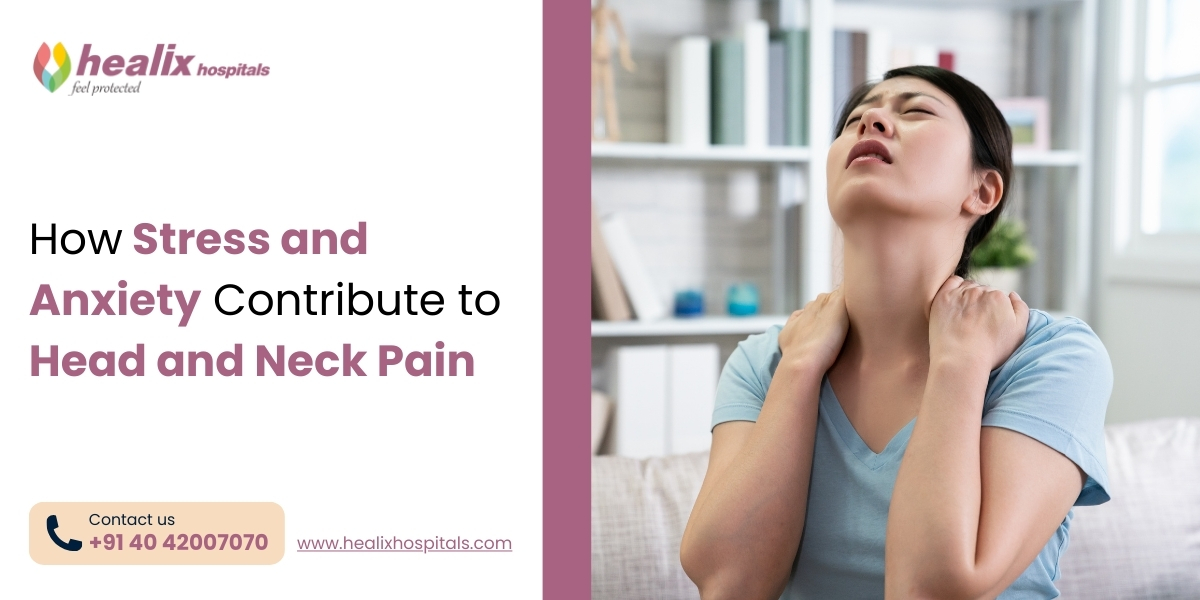

Stress and anxiety are not just mental burdens; they have a profound impact on the body, manifesting in physical symptoms like head and neck pain. This condition, commonly overlooked, affects millions of people and can significantly reduce the quality of life. The connection between mental health and physical discomfort, particularly in the head and neck, is undeniable.
At Healix Hospitals, we understand the complexities of stress and anxiety head and neck pain and its multifaceted nature. This blog delves into how stress and anxiety lead to pain, the underlying mechanisms, and actionable strategies for managing these symptoms effectively.
How Stress and Anxiety Head and Neck Pain are Linked
The relationship between stress and anxiety head and neck pain is rooted in the body’s stress response. When faced with a stressful situation, the brain signals the release of stress hormones, such as cortisol and adrenaline. These hormones prepare the body for action by increasing heart rate, tightening muscles, and sharpening focus. While helpful in emergencies, prolonged stress keeps muscles, particularly in the head and neck, in a state of tension.
Muscle Tension and Emotional Stress
One of the most significant contributors to stress-induced pain is muscle tension. Anxiety causes the body to brace itself, leading to anxiety muscle tightness, particularly in the neck and shoulders. Over time, this tension can develop into chronic neck pain causes, leading to a vicious cycle of discomfort and worry.
Additionally, emotional stress pain often manifests in postural issues. Many people under stress hunch their shoulders or clench their jaws, adding to the strain on neck muscles.

Symptoms of Stress and Anxiety-Related Pain
Stress and physical symptoms often go hand in hand. In addition to head and neck pain, individuals may experience:
- Tension headaches: A feeling of tightness or pressure around the head, often radiating to the neck.
- Stress-related migraines: Throbbing headaches triggered by prolonged stress.
- Fatigue and stiffness
- Dizziness and jaw pain.
- Difficulty concentrating.
These symptoms demonstrate how deeply intertwined mental health and physical well-being are. Addressing both aspects is critical for effective relief.
Types of Head and Neck Pain Caused by Stress
Tension Headaches
Tension headaches are the most common type of stress-related discomfort. They often feel like a band tightening around the head and are exacerbated by neck tension. These headaches are a classic example of how stress-induced pain impacts daily life.
Stress-Related Migraines
Stress-related migraines occur due to changes in brain chemicals triggered by stress. They are often accompanied by stiffness in the neck, reinforcing the link between neck pain and anxiety.
Chronic Neck Pain
Long-term stress can lead to chronic neck pain causes due to constant muscle tension. This persistent pain can interfere with daily activities, sleep, and overall well-being.
How to Manage Stress and Anxiety Head and Neck Pain
At Healix Hospitals, we adopt a holistic approach to treating stress and anxiety head and neck pain, addressing both the mental and physical components. Here are some effective strategies:
1. Practice Relaxation Techniques
Techniques such as deep breathing, progressive muscle relaxation, and meditation can alleviate anxiety muscle tightness and help manage emotional stress pain. These methods calm the nervous system and promote muscle relaxation.
2. Physical Therapy and Exercise
Targeted exercises improve posture, reduce stiffness, and relieve neck pain and anxiety. Stretching and strengthening the neck and shoulder muscles can prevent recurrent episodes of stress-induced pain.

3. Cognitive Behavioral Therapy (CBT)
CBT is a proven method for managing anxiety. By identifying and reframing negative thought patterns, it reduces stress levels and helps alleviate stress and physical symptoms like muscle tension and pain.
4. Maintain a Healthy Lifestyle
- Hydration and nutrition: Dehydration can exacerbate muscle cramps, so drink plenty of water. A diet rich in magnesium and vitamin B can reduce stress-related migraines.
- Adequate sleep: Poor sleep quality can worsen tension headaches and delay recovery from chronic neck pain causes.
5. Therapeutic Massages
Massage therapy is highly effective in releasing anxiety muscle tightness and reducing neck pain and anxiety. A professional massage focuses on trigger points, promoting relaxation and improving blood flow.
6. Stress Management Programs
At Healix Hospitals, we offer specialized programs designed to address stress-induced pain holistically. Our multidisciplinary approach combines physical therapies, mental health counseling, and lifestyle modifications.
When to Seek Professional Help
While home remedies and lifestyle changes can provide relief, persistent or severe stress and anxiety head and neck pain may require medical intervention. If your symptoms are impacting your quality of life, consult the experts at Healix Hospitals.
Our specialists are trained to identify the root causes of chronic neck pain causes and offer tailored treatments that address both physical and emotional triggers. By combining evidence-based therapies with personalized care, we aim to provide long-lasting relief.
Breaking the Cycle of Stress and Pain
Understanding the link between stress and anxiety head and neck pain is the first step toward recovery. By recognizing the physical manifestations of stress and anxiety, individuals can take proactive measures to manage their symptoms.
At Healix Hospitals, we are committed to helping patients overcome the challenges of stress-induced pain. From addressing tension headaches to alleviating emotional stress pain, our comprehensive care ensures that no aspect of your well-being is overlooked.
Take control of your health today by addressing the root causes of your discomfort. Remember, your journey to a pain-free life starts with understanding and managing your stress and anxiety.
Also Read: Boosting Gut Health in Winters: Probiotic and Prebiotic Tips from Healix Hospitals